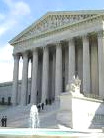|
|
|
Federal Appeals Court Rejects Medical Marijuana
Breaking Legal News |
2007/03/14 20:29
|
 The U.S. Ninth Circuit Court of Appeals in San Francisco decided unanimously against Oakland resident Angel Raich, who suffers from a variety of ailments including scoliosis, a brain tumor, and chronic nausea, even though her doctor testified that it was the only effective treatment to ease her pain and help her appetite. The judges indicated that Raich would possibly be able to avoid conviction under the medical necessity argument, but that she was not immune to arrest and prosecution nor was any other medical-marijuana patient who claimed medical necessity.
Raich’s case reached the Supreme Court in 2005, but the high court ruled that state laws providing for medical marijuana did not protect their citizens from federal prosecution. Currently, there are 11 states (including California) that have legalized medical marijuana. The Supreme Court then bumped the case back down to the appeals court, who ruled on a much narrower aspect of the case namely, whether or not absolute medical necessity precluded the government’s ability to prosecute these cases. According to the three-judge panel, it does not. In a related story out of Oregon today, where medical pot has been legal since 1998, the state Senate passed a measure allowing employers to fire medical-marijuana patients who fail drug tests. The measure still has to be approved in the House and be signed by the governor. Oregon has 13,000 registered medical-marijuana users, and their supporters had been pushing for a bill that protected them from being fired. Instead, the opposite measure was passed. Supporters contend that a simple urine test, which would yield a positive result for as long as 30 days after ingestion of pot, does not accurately reflect whether or not an employee was impaired or intoxicated during work hours. Despite the controversial nature of the medical-marijuana issue and the fact that voters in several states have overwhelmingly shown support for the measure the U.S. Justice Department has only intensified its prosecution of medical pot. An Associated Press report this past weekend noted that the Drug Enforcement Agency (DEA) was “embarking on a stepped-up effort targeting [medical-marijuana] clinics” they suspected of generating an inordinate amount of profit. On one day in January, the DEA raided 11 clinics in the Los Angeles area. Since state laws are being ruled virtually meaningless by the court system and since the federal government seems intent on prosecuting these cases, it appears that amending the federal Controlled Substances Act may be the only true recourse for medical-marijuana supporters. However, the influence of the pharmaceutical and tobacco lobbies alone make this approach rather unlikely to succeed. |
|
|
|
|
|
|
Texas lawmakers vote on cancer vaccine
Breaking Legal News |
2007/03/14 09:42
|
| Texas lawmakers are fighting to block the governor‘s order requiring that sixth-grade girls be vaccinated against the virus that causes cervical cancer, with the House giving key approval to a bill to make the shots strictly voluntary. The House voted 119-21 on Tuesday to approve a bill that would keep the vaccine off the list of required shots for school attendance. The measure was likely to get a final House vote Wednesday to send it on to the state Senate. The vaccine protects girls against some strains of human papillomavirus, or HPV, a sexually transmitted virus that causes most cases of cervical cancer. A February report by the federal Centers for Disease Control and Prevention estimated that one in four U.S. women ages 14 to 59 is infected with the virus. Lawmakers said the governor circumvented the legislative process. The governor‘s office has estimated that only 25 percent of young women in Texas would get the vaccine if it is not mandatory. Critics also have argued that the vaccine, called Gardasil, was too new and its effects needed to be further studied before mandating it for Texas schoolgirls. The Food and Drug Administration approved Gardasil last year. Although the Wyoming Legislature recently rejected a request for $4 million specifically to fund HPV vaccination, the state‘s Department of Health intends to continue offering the vaccine to eligible girls with existing funding until the money run out.
|
|
|
|
|
|
|
Alberto Gonzales rejects calls for resignation
Breaking Legal News |
2007/03/13 23:27
|
| US Attorney General Alberto Gonzales said Tuesday he will not resign from his position in response to growing controversy over the firings last year of eight US Attorneys that may have been politically motivated. Gonzales nonetheless accepted responsibility and admitted "mistakes were made" when the US Department of Justice (DOJ) publicly dismissed the US Attorneys and subsequently misled Congress about the firings. According to e-mails revealed Tuesday, Gonzales' Chief of Staff Kyle Sampson and former White House counsel Harriet Miers suggested firing all 93 US Attorneys at the beginning of President Bush's second term. Sampson resigned from his position Monday. In response to Gonzales' comments, Sen. Charles Schumer (D-NY), among others, renewed his calls for Gonzales to resign in a statement on the Senate floor. Several high-ranking Democratic senators also called for Gonzales' resignation Monday in the wake of revelations in an official audit that the FBI broke and misused laws in obtaining personal information from telephone companies, Internet service providers, banks, and credit bureaus under the Patriot Act. |
|
|
|
|
|
|
Law firm bookkeeper gets 6 years in jail
Breaking Legal News |
2007/03/13 16:39
|
| A law firm’s former bookkeeper was sentenced to six years in prison for stealing more than $1 million from her employer by writing checks to herself and her family from bank accounts. Candace Vail, 60, of Batavia, also was ordered Monday by Hamilton County Common Pleas Judge Charles Kubicki Jr. to repay the money stolen from the Goodman & Goodman firm from January 2001 to February 2006. Vail, who pleaded guilty last month to a theft charge, used the money to fund her son’s landscaping business and to care for ailing parents, according to prosecutors and court records. An attorney for the family owned Cincinnati law firm discovered several bounced checks during a trip to the bank in March 2006. In a letter to the court in which a defendant often expresses remorse or apologizes, Vail wrote that the firm didn’t pay her enough and failed to issue her last paycheck after she was fired. She earned $26,500 a year. Her letter also detailed all the tasks she said she performed for the firm over the years, including buying fans when the air conditioning did not work and filling parking meters for clients. |
|
|
|
|
|
|
Viacom files $1B lawsuit against YouTube, Google
Breaking Legal News |
2007/03/13 15:27
|
| Media giant Viacom filed a lawsuit Tuesday for copyright infringement against the website YouTube and owner Google, seeking over $1 billion in damages and an injunction that would prohibit further infringement. Viacom, which owns Comedy Central, MTV, VH1 and other media outlets, alleges in its complaint that over 160,000 unauthorized video clips have been posted on YouTube. According to a Viacom press release: YouTube's strategy has been to avoid taking proactive steps to curtail the infringement on its site, thus generating significant traffic and revenues for itself while shifting the entire burden – and high cost – of monitoring YouTube onto the victims of its infringement. This behavior stands in stark contrast to the actions of other significant distributors, who have recognized the fair value of entertainment content and have concluded agreements to make content legally available to their customers around the world.
YouTube has been sued for copyright infringement before and Google currently faces other litigation over its search services. Last month, a Belgian court ruled that Google had violated copyright law by linking to Belgian newspapers without receiving permission to do so, and ordered it to pay $32,500 per day until the content was removed. Google has also been sued by Copiepresse, which represents 17 German and French language newspapers, for copyright infringement. The media outlets are pushing to have Internet engines like Google pay for links to the European news and many of the newspapers are in negotiations with Google to reach such agreements. Two of the five Copiepresse groups that sued have already settled with Google. |
|
|
|
|
|
|
New Jersey jury awards $20 million in Vioxx trial
Breaking Legal News |
2007/03/13 00:24
|
A New Jersey jury awarded a plaintiff $20 million in the latest Vioxx litigation on Monday. The jury found that the drug, distributed by Merck, caused the plaintiff's heart attack and that had the plaintiff's doctor known of the risks associated with Vioxx he would not have prescribed it to the plaintiff. During the first phase of the trial, the jury found that Merck had not adequately warned doctors and consumers about the increased risk of heart attack associated with the drug. Last week, a New Jersey Superior Court upheld a separate jury verdict that found Merck adequately warned physicians of the risks associated with Vioxx. Merck faces more than 27,000 lawsuits from people who say they were harmed by the once $2.5 billion-a-year drug before it was pulled from the market in September of 2004. Merck has set aside $1 billion to fight every Vioxx court challenge. In November 2006, a federal judge declined to certify a national class action suit, ruling that it made more sense to try the cases in their respective states of origin. |
|
|
|
|
|
|
D.C. Court Rules for Individual Gun Rights
Breaking Legal News |
2007/03/12 11:50
|
| The U.S. Court of Appeals for the D.C. Circuit has come down on the side of the rights of individuals to own firearms in striking down parts of Washington, D.C.'s gun-control ordinance, one of the strictest in the nation. The ruling could force the U.S. Supreme Court to render its first decision on the meaning of the Constitution's Second Amendment since 1939. By a 3-2 vote, the court issued a ruling (.pdf) that supports the opinion that the long-debated Second Amendment protects the rights of individuals, rather than a group or militia, to own firearms. The provisions of D.C.'s gun control law struck down by the court banned the carrying of handguns inside private homes and required that all privately-owned, licensed firearms be kept locked or disassembled. Writing in the court's majority opinion (.pdf), Senior Judge Laurence Silberman wrote, "There are too many instances of 'bear arms' indicating private use to conclude that the drafters intended only a military sense." Silberman's ruling was considered a challenge to the U.S. Supreme Court to review its landmark 1939 decision in United States v. Miller, which held that the Second Amendment bestowed gun ownership rights on a militia, rather than on individual citizens. Gun Rights Back to Supreme Court?
In a Legal Times article by Tony Mauro, Cato Institute's Roger Pilon is quoted as stating, "The issue has been teed up by Judge Silberman in such a way that no honest court can avoid dealing with it head-on," referring to D.C.'s probable appeal of the decision. "He has cut through all the fog surrounding the Second Amendment." It's ruling in United States v. Miller, stands today as the only definitive decision ever rendered by the Supreme Court on true meaning and legal effect of the Second Amendment, which states, "A well regulated Militia, being necessary to the security of a free State, the right of the people to keep and bear Arms, shall not be infringed." In tying gun ownership rights to a state militias, United States v. Miller, established the government's right to limit, through gun control laws, what types of firearms the public can legally "keep and bear." |
|
|
|
|
|
|
Class action or a representative action is a form of lawsuit in which a large group of people collectively bring a claim to court and/or in which a class of defendants is being sued. This form of collective lawsuit originated in the United States and is still predominantly a U.S. phenomenon, at least the U.S. variant of it. In the United States federal courts, class actions are governed by Federal Rules of Civil Procedure Rule. Since 1938, many states have adopted rules similar to the FRCP. However, some states like California have civil procedure systems which deviate significantly from the federal rules; the California Codes provide for four separate types of class actions. As a result, there are two separate treatises devoted solely to the complex topic of California class actions. Some states, such as Virginia, do not provide for any class actions, while others, such as New York, limit the types of claims that may be brought as class actions. They can construct your law firm a brand new website and help you redesign your existing law firm site to secure your place in the internet. |
Law Firm Directory
|
|










